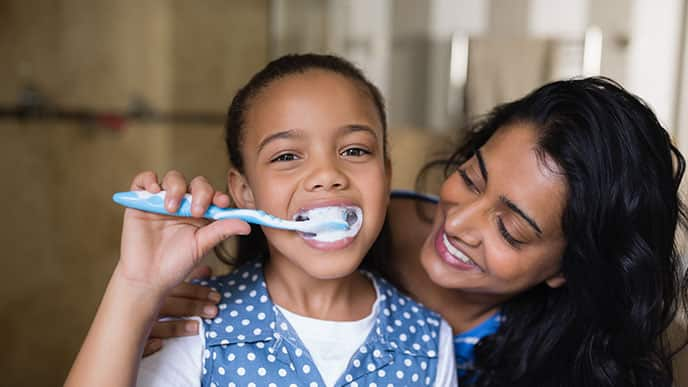Caring for Baby Gums
To keep your baby's gums healthy, wipe their upper and lower gums with a clean, wet washcloth after every feeding. Terry cloth finger cots, which fit over your fingers and are designed for cleaning your baby's gums, can also be used.
If your baby fusses, keep trying. They'll get used to the sensation of having the gums cleaned, and many babies may even learn to enjoy it.
Caring for Baby Teeth
As soon as your baby's first teeth appear, it's time to start using a toothbrush and toothpaste. Twice a day, gently brush your baby's teeth with a soft bristled toothbrush, and a grain-sized amount of fluoride-free toothpaste. The head of your baby's toothbrush should be specially sized for small children whose teeth are still developing.
When two or more of your baby's teeth are touching, you can start flossing regularly. Flossing helps to remove plaque and food particles from between the teeth and beneath the gum line.
Baby Cavities
Brushing is important because babies can develop cavities just like adults. In the early stages, cavities appear as white spots on the teeth. As the cavities get larger, you may see black or brown spots on your baby's teeth. Bad breath can also be a sign that your baby has a cavity.
Even though your baby's teeth will eventually fall out and be replaced with permanent teeth, it's still important to seek dental care for cavities. Baby teeth help your baby chew and speak, explains the ADA. They also save space in the mouth for permanent teeth, so if the baby teeth are lost too early due to decay, the permanent teeth may emerge crooked or crowded.
Baby Gum Disease
If plaque builds up inside your baby's mouth, they could develop gum disease. When you're cleaning your baby's mouth, check their gums for signs of this condition. Red, swollen gums are a sign of gum disease. Bleeding baby gums are another sign of gum disease; you may notice bleeding after brushing.
Gum disease can be treated with a good oral hygiene routine and professional dental cleanings. If it's not treated early, more invasive treatments, like deep cleaning or surgery, may be needed.
To keep your baby's gums and teeth healthy, start following an oral hygiene routine soon after birth, and make sure to take your baby to the dentist before their first birthday for a checkup.
This article is intended to promote understanding of and knowledge about general oral health topics. It is not intended to be a substitute for professional advice, diagnosis or treatment. Always seek the advice of your dentist or other qualified healthcare provider with any questions you may have regarding a medical condition or treatment.
ORAL HEALTH QUIZ
What's behind your smile?
Take our Oral Health assessment to get the most from your oral care routine
ORAL HEALTH QUIZ
What's behind your smile?
Take our Oral Health assessment to get the most from your oral care routine








.jpg)




